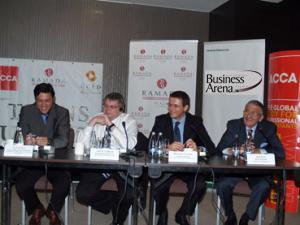Business leaders show confidence
With its 20 billion Euro financial "safety belt" granted by the international financial institutions, Romania has attracted direct foreign investments of around 2.055 billion Euro in the first four months of the year. Thus, the participants to "Crisis Turns into Business" seminar expressed their confidence in Romania's potential of reviving its economy in the short term. Organized in partnership with Rosia Montana Gold Corporation, Acca and Ramada Plaza, the event tackled topics such as IMF's financial support, banks' strategies in the current economic context and the contribution of the Chamber of Commerce and Industry to supporting the local business environment and private investment projects. According to ARIS, Romania will see direct foreign investments of between 4.5 and five billion Euro this year
Referring to the difficulties associated with this period of economic crisis, Tonny Lybek, the IMF resident representative, said: "One of the challenges that many emerging countries like Romania are facing stems from the lower external demand, slowdown in domestic demand and employment uncertainty. In addition, the domestic market has also seen a slump in real estate prices and other challenges, such as those related to securing external financing." Regarding the financing deal agreed with Romania, he said: "The size of the so-called "safety-belt" for Romania is 20 billion Euro spread over two years. The agreement has four components. The biggest one is covered by the IMF, while the European Union covers the second-largest component, worth five billion Euro. The other two components come from the World Bank, which will grant three loans, and from the EBRD." Tackling the recent economic trends, Bogdan Baltazar, well-known financial and business consultant, said: "International rating agencies have offered flawed forecasts regarding Romania. We used to hear opinions predicting that Romania's sizeable current account deficit would lead to economic disaster, but nothing of the sort happened. The country reached a seven per cent current account deficit and no one felt its impact. We haven't witnessed a hard landing, but we have seen the automatic stabilizers in action. For instance, demand decreased substantially, exports saw a milder decline compared to demand and foreign investments remained at a good level. The FDI forecast for 2009 stands at five billion Euro, with 1.5 billion Euro recorded in the first four months. Also the remittances from Romanian workers abroad are still going strong." Baltazar added: "In a way, I feel flattered that the international rating agencies tend to be more severe in their evaluations of Romania. That is because Romania remains a very interesting country for investors, with high profit margins. Also, loans are largely paid back on time in Romania. Surely, the volume of non-performing loans has increased, but they went up from 0.7 to 2.7 per cent of the total volume." Emphasizing the importance of private initiative and investments for the consolidation of Romania's economy, Baltazar spoke in positive terms about a major industrial project, the Rosia Montana mining project. "I know the project. It is useful for Romania and I hope it gets the go-ahead. People talk with apprehension about cyanide, as if we were expected to drink it rather than use it in industrial operations. It seems that the less people know about a particular topic, the more they tend to talk about it." Referring to the Environment Ministry's decision to suspend the evaluation of the project due to the absence of a valid town planning permit, Baltazar said: "I cannot understand what connection might be between an urban planning certificate and a mining project. The environment analysis should strictly focus on aspects related to environment issues." In turn, Dragos Tanase, managing director, Rosia Montana Gold Corporation said the investment at Rosia Montana had been launched ten years ago. Emphasizing that Romania holds a 20 per cent stake in the project, Tanase indicated that the total investment would reach around 1.8 billion USD. "The company has already spent 380 million USD, without posting any revenues. To build the mine itself, we need another 876 million USD, plus working capital. We will also invest some 400 million USD in environment protection and cleaning, while 77 million Euro will be earmarked for infrastructure development." He added: "The gold deposit at Rosia Montana amounts to 314 tonnes, while, for comparison, the central bank's reserve comprises around 105 tonnes of gold. The deposit has a value of 7.5 billion USD, while the exploitation operations will last 16 years. Of the total amount of 7.5 billion USD, four billion will remain in Romania's economy. The construction of the mine will have a two-year duration and create 2,300 jobs. Another 800 jobs will be generated by the exploitation activities. The project will also create opportunities for other companies. Our project is due to be evaluated by the Environment Ministry." On a different subject, Dan Pavel, deputy manager with the Public Relations Department of the Chamber of Commerce and Industry of Romania, pointed out that the Chamber was represented in various dialogue committees, in its bid to defend the interests of the business community. "We are also focusing on putting in contact business people and officials in different sectors by organizing seminars and conferences," he added.
S-ar putea să îți placă:
COMENTARII:
Fii tu primul care comenteaza




